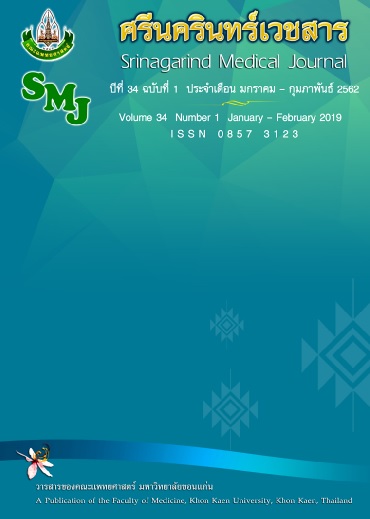Impact of Smartphone and Tablet Use on Health and Academic Performance of Pharmacy Students at Srinakharinwirot University
Keywords:
smartphone, tablet, health, academic performance, pharmacy student, สมาร์ทโฟน, แท็บเล็ต, สุขภาพ, ผลการเรียน, นิสิตเภสัชศาสตร์Abstract
ผลของการใช้สมาร์ทโฟนและแท็บเล็ตต่อสุขภาพและผลการเรียนของนิสิตเภสัชศาสตร์ มหาวิทยาลัยศรีนครินทรวิโรฒ
วรรณคล เชื้อมงคล1*, ธีรวิทย์ อินทิตานนต์1, จตุพร หวังเสต1
1สาขาวิชาเภสัชกรรมคลินิก คณะเภสัชศาสตร์ มหาวิทยาลัยศรีนครินทรวิโรฒ 26120
หลักการและวัตถุประสงค์: จากการสำรวจพฤติกรรมการใช้อินเทอร์เน็ตในประเทศไทย ปีพ.ศ. 2559 พบกลุ่มเจนเนอร์เรชั่นวาย (อายุ 18-37 ปี) เป็นกลุ่มที่มีการใช้งานอินเทอร์เน็ตจากสมาร์ทโฟนมากที่สุดพฤติกรรมดังกล่าวอาจส่งผลต่อสุขภาพและผลการเรียนในกลุ่มนี้ได้ ดังนั้นการศึกษานี้จึงมีวัตถุประสงค์เพื่อศึกษาผลของการใช้สมาร์ทโฟนและแท็บเล็ตต่อสุขภาพและผลการเรียนของนิสิตเภสัชศาสตร์ มหาวิทยาลัยศรีนครินทรวิโรฒ
วิธีการศึกษา: เป็นการศึกษาเชิงพรรณนาแบบภาคตัดขวางในนิสิตเภสัชศาสตร์ มหาวิทยาลัยศรีนครินทรวิโรฒ ที่ลงทะเบียนเรียนในปีการศึกษา 2560 เก็บข้อมูลโดยใช้แบบสอบถามซึ่งประกอบด้วย ข้อมูลทั่วไป ข้อมูลด้านการใช้สมาร์ทโฟนและแท็บเล็ต ดัดแปลงจาก Smartphone Addiction Scale-Short version (SAS-SV) ข้อมูลสุขภาพทางกาย ซึ่งพัฒนาโดยผู้วิจัย และข้อมูลสุขภาพทางจิต ใช้แบบคัดกรอง Center for Epidemiologic Studies Depression Scale (CES-D) ฉบับภาษาไทย ในการประเมินภาวะซึมเศร้า และใช้แบบทดสอบความเครียดสวนปรุง 20 ข้อ (Suanprung Stress Test -20) ในการประเมินความเครียด
ผลการศึกษา: มีนิสิตเภสัชศาสตร์สมัครใจเข้าร่วมการวิจัยทั้งสิ้น 391 ราย ส่วนใหญ่เป็นเพศหญิง อายุเฉลี่ย 21.6 ปี มีการใช้สมาร์ทโฟนอย่างเดียวร้อยละ 75.7 ระยะเวลาที่ใช้สมาร์ทโฟนและ/หรือแท็บเล็ตส่วนใหญ่คือ 3-4 ชั่วโมงต่อวัน ความถี่ในการใช้สมาร์ทโฟนและ/หรือแท็บเล็ตส่วนใหญ่คือ 11-20 ครั้งต่อวัน และมีนิสิตติดสมาร์ทโฟนและ/หรือแท็บเล็ตร้อยละ 39.1 ด้านข้อมูลสุขภาพทางกายพบว่า ส่วนใหญ่มีสุขภาพทางกายโดยรวม “เป็นปกติ” (ร้อยละ 70.1) และเมื่อพิจารณาสุขภาพทางกายรายด้าน พบว่านิสิตส่วนใหญ่ “เริ่มมีปัญหา” สุขภาพทางกายด้านการใช้ชีวิตประจำวัน และด้านความจำและสมาธิ ด้านข้อมูลสุขภาพทางจิตพบภาวะซึมเศร้าร้อยละ 32.5 และนิสิตมีความเครียดระดับปานกลาง และสูง ร้อยละ 41.4 และ 38.6 ตามลำดับ เมื่อวิเคราะห์ผลการติดสมาร์ทโฟนและ/หรือแท็บเล็ตต่อสุขภาพทางกาย พบว่าการติดสมาร์ทโฟนและ/หรือแท็บเล็ตมีผลต่อสุขภาพทางกายโดยรวม สุขภาพด้านสายตา สุขภาพด้านการได้ยิน สุขภาพด้านความจำและสมาธิ และสุขภาพด้านความเจ็บป่วย อย่างมีนัยสำคัญทางสถิติ (p ≤ 0.05) นอกจากนี้ยังพบว่า การติดสมาร์ทโฟนและ/หรือแท็บเล็ตมีผลต่อภาวะซึมเศร้า และความเครียด อย่างมีนัยสำคัญทางสถิติ (p ≤ 0.05) แต่ไม่มีผลต่อผลการเรียนอย่างมีนัยสำคัญทางสถิติ
สรุป: การติดสมาร์ทโฟนและ/หรือแท็บเล็ต มีผลต่อสุขภาพทางกายโดยรวม และสุขภาพจิต แต่ไม่พบผลกระทบต่อผลการเรียนของนิสิตเภสัชศาสตร์ มหาวิทยาลัยศรีนครินทรวิโรฒ
Background and Objectives: The survey of Thailand internet use profile 2016 found that generation Y (18-37 years old) was the most internet overusers and smartphone was the most popular digital devices. Lifestyle of smartphone overusers might affect their health and academic performance in young adults. This study aimed to investigate the impact of smartphone and tablet use on health and academic performance of pharmacy students at Srinakharinwirot University.
Methods: A cross-sectional descriptive study was performed in all pharmacy students enrolled in the academic year 2017. Data was collected by research questionnaire including general characteristics, the smartphone and tablet use modified from Smartphone Addiction Scale-Short Version (SAS-SV), physical health data developed by researchers and mental health data evaluated by Center for Epidemiologic Studies Depression Scale (CES-D) Thai version for depression test and Suanprung Stress Test -20 for stress test.
Results: Three hundred and ninety-one of pharmacy students voluntarily participated in the study. Most of them were female with mean age 21.6 years old. 75.5% of them used only smartphone. Duration and frequency of smartphone and/or tablet use were 3-4 hours per day and 11-20 times per day, respectively. Smartphone and/or tablet addiction was indicated to 39.1% of total. Physical health data showed that most participants (70.1%) were “normal health” measured in term of the total physical health. For considering physical health data by each category, it found that most participants were “beginning of physical health problem” in the daily life and the memory and concentration categories. Mental health data revealed 32.5% of depression, 41.4% of moderate stress and 38.6% of high stress. Smartphone and/or tablet addiction showed statistically significant effect on the total physical health, the vision health, the hearing health, the memory and concentration and the sickness categories (p ≤ 0.05). Moreover, smartphone and/or tablet addiction had significant impact on depression and stress (p ≤ 0.05). However, it had no effect on academic performance.
Conclusion: Smartphone and/or tablet addiction had significant impact on the total physical health and mental health and still no effect on academic performance in pharmacy students at Srinakharinwirot University.
References
Electronic Transactions Development Agency (Public Organization). Thailand internet user profile 2016. Bangkok: Ministry of Information and Communication Technology, 2016.
Chatterjee C. 3 reasons not to sleep with your phone in the bed [Internet]. 2014 [cited Dec 12, 2016]. Available from: http://abcnews.go.com/Health/reasons-sleep-phone-bed/story?id=24839804.
Thomée S, Härenstam A, Hagberg M. Mobile phone use and stress, sleep disturbances, and symptoms of depression among young adults - a prospective cohort study. BMC Public Health 2011; 11: 1-11.
Hwang KH, Yoo YS, Cho OH. Smartphone overuse and upper extremity pain, anxiety, depression and interpersonal relationships among college students. Korea Constent Assoc 2012; 12: 365-75.
Intolo P, Sirininlakul N, Saksanit N, Kongdontree P, Thuwatorn P. pain and muscle activity of neck, shoulder, upper back and arm during smartphone use in women aged 18-25 years old. J Health Syst Res 2016; 10: 351-60.
Aggarwal K. Twenty-six percent doctors suffer from severe mobile phone-induced anxiety: excessive use of mobile phone can be injurious to your health. Indian J Clin Pract 2013; 24: 7–9.
Szyjkowska A, Gadzicka E, Szymczak W, Bortkiewicz A. The risk of subjective symptoms in mobile phone users in Poland-an epidemiological study. Int J Occup Med Environ Health 2014; 27: 293-303.
World Health Organization. What are the health risks associated with mobile phones and their base stations [Internet]. 2013 [cited Oct 3, 2016]. Available from: http://www.who.int/features/qa/30/en/.
Electromagnetic health. WHO/IARC classifies radiofrequency electromagnetic fields as possibly carcinogenic to humans [Internet]. 2011 [cited Oct 3, 2016]. Available from: http://electromagnetichealth.org/electromagnetic-health-blog/iarc-rf-carc/.
Kovach C. World Health Organization: cell phones may cause cancer [Internet]. 2016 [cited Oct 3, 2016]. Available from: http://www.businessinsider.com/cell-phones-cause-cancer-2011-5.
Kwon M, Kim DJ, Cho H, Yang S. The smartphone addiction scale: development and validation of a short version for adolescents. PLoS ONE 2013; 8: e83558.
Ruangtrakool S. Depression and suicide. Bangkok: Ruenkaew Printing, 2000.
Phattharayuttawat S. Manual of psychological testing. 3rd edition. Bangkok: Medical Media Co.Ltd, 2005.
Mahatnirunkul S, Pumpaisanchai W, Tapanya P. Research report: the construction of Suanprung Stress Test. Chiangmai: Suanprung Psychiatric Hospital, 1997.
Lee M, Hong Y, Lee S, Won J, Yang J, Park S, et al. The effects of smartphone use on upper extremity muscle activity and pain threshold. J Phys Ther Sci 2015; 27: 1743-5.
Matar boumosleh J, Jaalouk D. Depression, anxiety, and smartphone addiction in university students-a cross sectional study. PLoS ONE 2017; 12: e0182239.
Babadi-akashe Z, Zamani BE, Abedini Y, Akbari H, Hedayati N. The relationship between mental health and addiction to mobile phones among university students of Shahrekord, Iran. Addict Health 2014; 6: 93-9.
Samaha M, Hawi NS. Relationships among smartphone addiction, stress, academic performance, and satisfaction with life. Comput Human Behav 2016; 57: 321-5.


